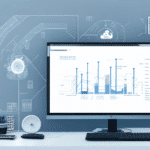Infor CloudSuite Industrial (SyteLine) vs Epicor ERP: A Comprehensive Comparison
Choosing the right Enterprise Resource Planning (ERP) software is crucial for the success of any business. Two of the leading options in the market are Infor CloudSuite Industrial (SyteLine) and Epicor ERP. Both platforms offer robust solutions tailored to various industries, but each has its unique strengths and weaknesses. This article provides an in-depth analysis to help you determine which ERP system aligns best with your business needs.
Key Differences in Functionality and Features
Industry-Specific Capabilities
Infor CloudSuite Industrial (SyteLine) is designed primarily for the manufacturing and distribution sectors. It offers features like shop floor control, advanced planning and scheduling, and quality management, making it ideal for businesses with complex manufacturing processes.
Epicor ERP, on the other hand, provides a more flexible and customizable solution suitable for a wide range of industries, including manufacturing, distribution, retail, and services. Its modular design allows businesses to tailor the system to their specific requirements.
Implementation and Customization
The implementation process for Infor CloudSuite Industrial (SyteLine) is typically longer due to its comprehensive feature set. This complexity ensures a more tailored solution for manufacturing and distribution but may require more time and resources to deploy.
Epicor ERP offers a quicker implementation timeline, which can be advantageous for businesses needing rapid deployment. Its high degree of customization allows companies to adjust the system post-implementation to better fit their evolving needs.
Reporting and Analytics
Infor CloudSuite Industrial (SyteLine) excels in out-of-the-box reporting options, enabling businesses to generate detailed insights without extensive configuration. Its advanced analytics capabilities support data-driven decision-making processes.
Epicor ERP also offers robust reporting and analytics but may require more customization to achieve the same level of detail as Infor's solution. However, it provides flexibility for businesses to develop tailored reports that meet their specific requirements.
Implementation and Pricing Considerations
Implementation Time
Epicorer ERP generally boasts a shorter implementation timeframe, making it suitable for businesses looking to deploy their ERP systems swiftly. Conversely, Infor CloudSuite Industrial (SyteLine) may take longer to implement due to its extensive features and industry-specific functionalities.
Pricing Models
Pricing for both ERP systems varies based on the size of the organization, the number of users, and the specific modules selected. Infor CloudSuite Industrial (SyteLine) tends to have a higher upfront cost but may offer greater long-term value through its specialized features.
Epicor ERP often presents a more cost-effective solution initially, with flexible pricing models such as subscription-based or perpetual licenses. Businesses should evaluate their budget constraints and long-term ROI when making a decision.
User Experience and Support
Interface and Usability
Epicor ERP is known for its user-friendly and customizable interface, allowing users to tailor their dashboards and workflows to their liking. This flexibility can enhance user adoption and satisfaction.
Infor CloudSuite Industrial (SyteLine) offers a streamlined user experience with its intuitive design, facilitating easier navigation and quicker onboarding for new users.
Customer Support and Resources
Both platforms provide comprehensive customer support, including online resources, phone, and email assistance. Infor CloudSuite Industrial (SyteLine) additionally fosters a strong user community, enabling peer-to-peer support and knowledge sharing.
Epicor ERP offers a dedicated customer portal for tracking support tickets, accessing documentation, and utilizing training materials, ensuring that users have access to necessary resources when needed.
Integrations and Scalability
Integration Capabilities
Infor CloudSuite Industrial (SyteLine) integrates seamlessly with other Infor products, such as CRM and PLM software, providing a unified ecosystem for business operations. It also supports integrations with manufacturing-specific tools like CAD software.
Epicor ERP emphasizes open integration capabilities, allowing it to connect with a wide range of third-party applications across various business functions, including financial and accounting software.
Scalability
Both ERP systems are scalable, but they approach growth differently. Infor CloudSuite Industrial (SyteLine) is well-suited for handling complex manufacturing and distribution operations, making it ideal for businesses anticipating significant growth in these areas.
Epicor ERP’s modular design allows businesses to add or remove functionalities as needed, making it a versatile choice for companies planning to expand into diverse industries or requiring flexible scaling options.
Conclusion: Choosing the Right ERP for Your Business
Both Infor CloudSuite Industrial (SyteLine) and Epicor ERP offer powerful ERP solutions with distinct advantages. When selecting between the two, consider the following:
- Industry-Specific Needs: If your business operates in manufacturing or distribution with complex processes, Infor may be the better choice.
- Customization and Flexibility: For businesses requiring high levels of customization across various industries, Epicor may offer the flexibility you need.
- Implementation Timeline: If a faster deployment is essential, Epicor’s streamlined implementation could be advantageous.
- Budget Considerations: Evaluate the total cost of ownership, including implementation, licensing, and support, to determine which solution offers the best ROI for your business.
Ultimately, the best ERP system aligns with your business goals, operational requirements, and budget constraints. Conduct thorough research, possibly engage with both vendors for demos, and consult with industry experts to make an informed decision.




















